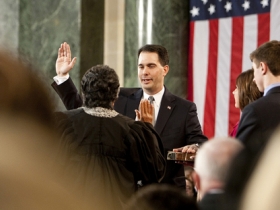Wisconsin a Tax Heaven for Businesses
The evidence suggests taxes are low on businesses, and have been for many years.
For many years the Wisconsin Manufacturers and Commerce has complained that this state was a “tax hell” that over-taxed businesses. The WMC and conservative talk radio constantly slammed Democratic Gov. Jim Doyle as bad for business. Scott Walker took up that line when he ran for governor in 2010, even promising the Metropolitan Milwaukee Association of Commerce that he would completely eliminate the corporate income tax.
As it turned out, Walker offered more modest measures. His first budget gave Wisconsin companies a tax break for every new job they added; The deductions were worth between $92 and $316 per job depending on the size of the company, according to the Legislative Fiscal Bureau, and were expected to cost $67 million over two-years.

Gov. Scott Walker
His current budget proposes to widen tax loopholes for businesses, and, more controversial, award indefinite amnesty to tax cheaters. Walker would allow businesses to avoid paying taxes in past years if the state previously knew of the underpayment but took no action.
“That’s extraordinary,” said State Rep. Cory Mason, D-Racine, a member of the Legislature Joints budget committee, in an article by the Wisconsin State Journal. “We talk about being tough on people who break the law, but this allows people to cheat.”
The implication is that Wisconsin is such a hell for businesses we must bend over backwards to make amends, even if it means letting businesses cheat on taxes. In fact, Wisconsin’s tax structure is better for businesses than in most states.
Perhaps the most in-depth reports on state taxes on business are done for the Council on State Taxation (COST), a “nonprofit trade association consisting of nearly 600 multistate corporations engaged in interstate and international business.” The group hires the internationally-known company Ernst & Young to analyze state taxes on business.
In one study, the company looked at each state’s effective tax rate on new investments on business and found that Wisconsin ranked fourth lowest. The study used “the type of analysis that businesses use to evaluate decisions about where to locate new capital investments in plant and equipment” in order to “isolate the impact of state and local business tax systems on new capital investment, the cornerstone of state economic development.” Wisconsin was a national leader in this regard as of 2011, when Walker took office with a vow to reverse that allegedly anti-business perspective of Jim Doyle.
Of course, that’s only the picture for new investments. A critical measure, no doubt, but what about all taxes on business? Each year, COST also hires Ernst & Young to do such an analysis. The study found that Wisconsin’s total taxes on business were lower than 29 states. Nationally state and local business taxes as a share of the Gross State Product ranged from 3.5 percent (Oregon and North Carolina) to 15.4 percent (Alaska) Wisconsin, at 4.7 percent, was far below the median and slightly below the the average in tax impact on businesses. Once again, this was where Wisconsin stood when Doyle stepped down from office.
Are there other studies that make Wisconsin look worse in business taxes? Yes. The most notable is the Tax Foundation, an anti-tax group whose slap-dash reports for years did not even include a state’s property taxes. That’s rather significant, because the property tax on manufacturers in Wisconsin is very low, due to the machinery and equipment exemption, a measure created by Democratic governor Pat Lucey and which has driven down business taxes in Wisconsin and transferred the impact onto homeowners.
Some time after I wrote a Milwaukee Journal Sentinel story noting this omission by the Tax Foundation, it began to include the property tax. But the methodology of its reports is still suspect, and unlike Ernst & Young, it does not analyze taxes as a percent of Gross State Product.
Still, if you prefer the Tax Foundation’s reports, then things have gotten even worse under Walker. The group’s reports show this state ranked behind 40 states in business tax climate in 2011, based on 2010 data (Doyle’s last year), and ranked behind 42 states in 2013 (2012 data).
I doubt Walker would agree this accurately reflects what has happened on his watch, and he’d be right. It’s just a bad study and always has been.
All these studies, moreover, are merely looking at the nominal tax rates. They don’t tell you what a particular business is actually paying in taxes. That’s something that can be checked in Wisconsin, because the law allows you to request the net tax paid by companies or individuals. Former Journal Sentinel reporter Jack Norman did a study for the liberal group, Institute for Wisconsin’s Future, and found that in 2003, two out of three of the more than 54,000 corporate filers in Wisconsin paid no income tax. That included 26 of the 50 largest companies in the state.
There may be many reasons for this, but one possible factor is that the state lacks enough employees in the state Department of Revenue to go after all scoflaws. Walker’s budget proposes to hire 61 new DOR employees to upgrade the efforts to collect taxes owed and stop fraud. There is abundant evidence that such employees pay for themselves by collecting more taxes.
But Walker will obviously undercut that effort with his proposal allowing longtime scoflaws to evade the taxes they owe, because past DOR employees didn’t catch these businesses. As Mason has put it, “Nobody wants their taxes to be higher so that someone else can cheat.” But this is exactly what Walker’s proposal would accomplish.
The fixation on business taxes is particularly silly because there have been countless studies showing that differential levels of taxes are not a major factor in business location decisions. Another study found little relationship between business tax levels and job losses.
“One can certainly overstate taxes as a single factor in evaluating a state’s business climate,” as James Buchen of the WMC once confessed to Isthmus. Indeed, the group did just that, attacking Doyle relentlessly about this, even as he was handing out huge tax breaks and incentives to businesses in Wisconsin.
A much broader look at the business climate was recently done by Forbes magazine, which found that Wisconsin was the 8th worst state for business in America and was getting worse under Walker.
The rankings looked at a number of criteria: business costs, labor supply, regulatory environment, economic climate, growth prospects and quality of life. Like all such ratings, it is just a snapshot, and its hardly the last word on Walker’s attempt to make Wisconsin “open for business.”
But it does provide a cautionary note to those who think tax breaks and other giveaways to businesses are all we need to succeed. It won’t do any good to drive up corporate profits if this effort doesn’t also create jobs, improve schools and colleges and the overall quality of life in a state.
Forbes projects that Wisconsin’s job growth is likely to be second worst in the U.S. through 2016. There are many factors behind that dismal projection, but it’s a safe bet that taxes on business are at best a minor factor in the equation.
Murphy's Law
-
Is Legislature Biased Against Working Class?
 Apr 4th, 2024 by Bruce Murphy
Apr 4th, 2024 by Bruce Murphy
-
Associated Press Will Decline in Wisconsin
 Mar 27th, 2024 by Bruce Murphy
Mar 27th, 2024 by Bruce Murphy
-
City Attorney Race Is Vitally Important
 Mar 25th, 2024 by Bruce Murphy
Mar 25th, 2024 by Bruce Murphy

















But, but, but…Obama’s a socialist!
If Wisconsin is a tax haven then why did Doyle lose so many jobs and Kimberly Clark went to Texas. the combination of business taxes, income taxes and sales taxes make us a bad place to do business, plus all of the elitists in the state that hate business.
Doyle gave a few big breaks to places like mercury, the small guys that produce all the jobs never got anything.
A few points:
– Most business clients we have live in total fear of the IRS and worry about the “red flags” they are waving. I have always told them, it’s not the IRS you need to worry about, it’s the State. They do plenty of auditing and have been especially diligent in pursuing sales and use tax audits.
– Wisconsin places all sorts of taxes on business owners. There’s the unemployment tax which assesses a $504 tax on each hire that makes more than $14,000 per year for a new business. There’s the personal property tax which levies a tax on the equipment a business owns.
– A good number of Wisconsin Corporations are “Professional Service Corporations”. Each year they “zero out” their income by paying the owner a bonus which they remit personal taxes on.
– Yes, some large corporations get sweetheart deals and that bothers me as someone who is also trying to make it in business. Say you’re Mercury Marine and you have a bunch of Union jobs. Wisconsin will offer incentives. The same holds true when it comes to sweetheart financing deals if you happen to be a well connected coffee shop.
– A lot of business owners have been disappointed with Walker when it comes to taxes. He’s done nothing to repeal the tax increases Doyle pushed through at the end of his tenure. He’s done nothing to lower marginal tax rates. Combined reporting is still the law of the land. So far, all they’ve really proposed other than credits to companies that relocate here, is a rather tepid reduction to individual taxes. Meanwhile, companies are going to places like Indiana and even Illinois as those are real tax nirvana compared to Wisconsin.
– Wisconsin is not a complete tax hell. It’s not California, New York or some others, but we’re closer to the bottom then we are to the top.
To Mike Bark: Thanks for your note. Just an FYI: the taxes you mention (unemployment, personal property and pass through to personal income taxes) are included in the analysis by Ernst & Young which shows WI below average in total tax burden on businesses.
Bruce,
It also includes sales tax. Sales tax is the one area where Wisconsin is lower than most states and it’s also a tax that does not impact business all that much. There are plenty of exemptions in that tax for resellers and manufacturers as there should be to avoid double tax.
Even if we take the E&Y survey as gospel, Wisconsin would be a middle of the pack sort of state when it came to taxes. That’s hardly a tax heaven. As I said in my original post it’s not the tax hell it’s been made out to be, but I think overall we’re in the bottom half when it comes to business climate.
Illinois a tax nirvana? An Illinois business conservative would call you names for saying that. The conservative Tax Foundation puts Illinois 11th for business tax burden. I’d take anything a conservative think tank says with a metric ton of salt, but the point is that you can’t possibly believe what you said about Illinois being a tax nirvana. It’s not a tax nirvana even by your own criteria. You just made it up to win an argument. If you do believe it, your capacity for doublethink is greater than I would have thought.
And sales tax does impact businesses. Have you never dealt with a procurement department that buys non-inventory items? To leave out sales tax in a study like this would be tantamount to manipulating the data. Or is the real issue that the data hasn’t been manipulated to produce a result you like? I think the latter. Your intellectual honesty is already in question.
If you talk to just about any business owner the first tax they care about is the income tax rate. Our income tax rates are higher than Illinois and Indiana and on par with Minnesota. Sales tax only comes up when the State is conducting one of their many audits in this area.
It’s not that sales tax is not important, but it just isn’t as impactful to business in the same way as income tax and employment taxes. My firm’s biggest expense far and away is wages. No sales tax there. No sales tax on rent. No sales tax on professional services. Retailers are exempt as resellers. Manufacturers are exempt on most purchases. Construction companies build the tax directly into their quotes when they mark up materials.
The issue I have with Bruce’s article is his characterization of Wisconsin as tax heaven. Even the stats he uses only place Wisconsin in the middle of the pack. You’ll also note that I stated Wisconsin is not quite the tax hell it’s made out to be and that certain well connected companies do get preferential treatment.
So: the Murphy solution for getting the Wisconsin economy out of its four-decade decline?
I’ve got it: Start a business, Bruce. Hire some people. The giveaways to business will make you rich. Give ‘er a go.
Bruce, do you support amnesty for illegals living in the United States? (Think about it. It’s a very relevant question.)
Oh please, Kimberly Clark and a lot of other businesses in Wisconsin left or went into decline for all the normal reasons businesses change. Schlitz didn’t go down because of taxes. It was a spectacular failure of their executives that ruined the company. Once we were the machine shop of the world, and now we have a lot of empty buildings.
If we need an excuse and want to blame someone else, the government will do. But if we want to move forward, that’s a different story.
STACYm
“So: the Murphy solution for getting the Wisconsin economy out of its four-decade decline?
I’ve got it: Start a business, Bruce. Hire some people. The giveaways to business will make you rich. Give ‘er a go” – John Torinus
Bravo, Mr. Torinus.
One of the most frustrating thing about being a business owner is that there is a real perception out there that all we do is take advantage of people, get away with murder on taxes, and have it pretty easy. Yes, some chosen businesses do get some preferential treatment, but the overwhelming majority is not catching any breaks.
Your suggestion is perfect. If business is so easy and enjoys all of these perks it would be wise for people who have been employees most of their lives to go out and start a business.
I still remember what you said earlier about sales tax not mattering. Based upon your own guesstimation you’d have excluded it from the data. But that is what I mean when I say that there’s no such thing as academic rigor (or any other kind of rigor) in business. You don’t get to do a study like this and remove data willy-nilly from the results based on your opinion of what the data should look like.
As for your meta-opinion about business, no business should get preferential treatment of any kind. Sure some businesses don’t have it easy. So what? I have three things to say about that. First, the system still generally favors business much more than it should. Second, the motivation of owning a business is always banal greed no matter what kind of business it is. Third, having everybody gunning for you is just the price you pay for being rich so stop whining and get over it.
Fine, you know more about business so yes, every business out there loves being in Wisconsin because we have a relatively low sales tax.
As for your other points:
1. My opinion is that all businesses should be treated equally. Preferential financing options should not be given to coffee shops when they aren’t offered to other businesses that actually create better jobs. Tax credits should not be created to encourage certain industries over others.
2. So owning a business is all about banal greed. I’ll keep that in mind when I review your business plan. I’ll expect you to make no more than what it would take to subsist. I’ll expect your employees to make exactly what you do. I expect your pricing to be variable based on what a customer can afford. For what it’s worth, depending on which studies you believe, better than 50% of businesses that start fail. When they fail the owners usually have to declare bankruptcy. Awfully greedy people. By the way, why is it that you expect these greedy people to hire you? Why would I want an employee who can’t stand what I do? What sense does it make to hire someone who holds what I do in such low regard?
For me, being a business owner is more about your Orwellian rants. I’m not a slave to the whims of another person. Sure, I have to do a good job and keep customers happy, but no one person really controls my destiny. I could have kept working for a firm, but I was tired of filling out a time sheet and I was tired of the way the services were being offered. So I got out.
3. Being rich is a relative term. You said your parents were a college professor and an accountant. That’s pretty rich by most people’s standards. They definitely were making a lot more money than my parents were as I was growing up. My guess is that between salary and benefits they make around the same amount of money that my household makes. So are they a bunch of greedy people? Who’d they take advantage of to get their college degrees?
Thanks for illustrating my point so perfectly. There’s a good amount of people like you who feel that you are somehow more enlightened then us. Yet you expect us unwashed business owners to somehow provide you a living and do all the heavy lifting.
I recently completed the tax filings associated with a $7 million dollar project I completed in 2012. The accelerated depreciation allowable under federal guidelines was not applicable in Wisconsin, while it is in other states. This translates into substantially higher reportable WI income compared to our federal obligation. Just one anecdote to highlight a different perspective to the premise of the article.
I appreciate some of the perspectives shared here and usually find that different points of view can be informative. But I also find it so troubling how we put each other in simplistic boxes and so easily name-call. I happen to be a small business owner. I also happen to not be a traditional conservative. It is uninformed to stereotype me based solely on either of those two points.
I already told you, Mark, I don’t want to start any business. I want to start a non-profit. Not everybody wants to own a business. Some of us want to make a difference. Do you know anything about non-profits? Have you ever dealt with people who aspire to more than having a fat bank account?
You know jack and shit about my folks, Mark. Growing up we lived in the same rental housing as the students. It was a duplex on Main St and it was falling apart.
In your make-believe world teachers make six figures. In the real world they make on the middle low end of five figures. In the real world politicians cut education first whenever they need to balance a budget.
Ed,
Yes, we have several non-profit clients. I also serve as part of two non-profit boards.
Interestingly, the directors all take pretty good salaries that would lead to having a fat bank account. Some of them even make more money than I do. Perish the thought.
Ed,
Also, for what it’s worth I feel that what I do makes a difference. For example:
– We have helped dozens of other businesses get started. These businesses all go out and employ people in pretty well paying jobs.
– We have 13 employees at our firm and we’ve noticed that no one is quitting. I think some of that had to do with they feel like they have a good opportunity to move up and have been treated fairly. There are other firms and companies they could work for.
And I didn’t say either parent was making a 6 figure salary. You stated what they did as jobs and it’s a pretty safe assumption that between both salaries and benefits they had it better than a vast majority of the population. The top 25% of all taxpayers make a household income of $66,000 a year. If they made more than $32,000 they had it better than half of the population. So they likely had it better than 3 out of 4 people and at least more than 50%. So as I say, being rich is a pretty relative thing. If someone is making more than you are, they’re rich.
I don’t deny that I’ve had privilage. I’m a white male. That comes with privilage built in. My problem with you is that you have privilage, benefit from it, and completely deny that it was ever a factor. Privilege is how you were able to get 100k from the bank to start your business. Most people — me included — will never get that.
You misinterpret the points I’ve made:
– I have had some advantages. The biggest one was that I had very good parents who believed in Education and instilled a great work ethic into their kids. No everyone has that.
– I got the loan after accumulating nearly 10 years of experience, after having saved some money, and by having a solid business plan. No, you would not get that same loan right this minute, but you would if you accumulated some experience.
You don’t think I had good parents who believed in education and instilled work ethic into me? Again, that just shows that you know exactly jack and shit about my folks.
I’m just asking because you said that’s an advantage. It sounded a lot like a comparison. Who else would you like to compare yourself to, hm? Lets take the unluckiest black kid living in Milwaukee and lets have you say the difference between you and him is that your parents are better than his. Are you not willing to make that comparison?
I judge you because you view the world differently. You judge me because I view the world differently. The problem is that people who share your worldview call the shots deciding who makes it and who doesn’t. That’s privilege.
The third sentence should’ve ended with a gender neutral, “his or hers.”
It just occurred to me you’re a lot like Pangloss from Candide. Pangloss believed that our world is the best of all possible worlds in spite of all the evidence to the contrary. Today we have huge inequality and you still insist that anybody can make it with enough hard work. You choose to believe this in spite of all the evidence to the contrary just like Pangloss. The truth is that hard work is seldom rewarded. You made it through hard work but that’s just confirmation bias. It’s as though you had one good night at a casino and left thinking the same happens to everybody.
Ed,
I have no opinion on your parents. I merely indicated that having good ones was an advantage for me. It certainly was more of an advantage than not having good parents and I believe that their influence had something to do with their 5 kids being reasonably successful despite not having any economic advantages. The common thread of the 5 kids is that we’re all hard workers. 2 of my brothers never went to college (both are USAF) and they both own businesses that are pretty successful and employ people. My sisters are both currently working full-time and going through college while being married with kids. So far, hard work has been rewarded for us, because again, we didn’t come from any measure of financial wealth. Even my parents reinvented themselves. When I was in college so were both of my parents with My Dad becoming a MPS teacher and my Mom a nurse. If it was just me and all my siblings and my parents were unable to get jobs than maybe I’d agree that I somehow hit the lottery.
I also have no opinion on you. I disagree with your viewpoints, but you can check the comments and you’ll see that I never said you’re a bad person. That’s a lot different then your comments where you do those things.
“I also have no opinion on you. I disagree with your viewpoints, but you can check the comments and you’ll see that I never said you’re a bad person.”
That’s a lie. In just about every comment you’ve made you strongly imply or outright state that I’m lazy and just looking for a handout.
And yes, you are a bad person. You’re dishonest and selfish.
You aren’t beyond redemption though. All it takes is expanding your view outside your own mouse-trail.
“And yes, you are a bad person. You’re dishonest and selfish.”
So where does that put you Ed? You’re selfish too. There’s no reason to be upset about the way things work unless you want more for yourself. And you’re being dishonest by trying to cast down Mike but claiming you know the way to redeem him. So if selfish and dishonest make you a bad person, then welcome to the club Ed, we’ve been expecting you.
You seem to think that we’re all privileged because we acknowledged the way the world works and chose paths that worked within the system. You also keep making the point that anyone with a positive outcome in life must be benefiting from privilege. Just because your life isn’t where you want it to be doesn’t mean you haven’t had the same chances as the rest of us. You graduated from a better school than I did before the recession hit. I graduated from state school not affiliated with the Big 10, and at a time when every news story was about how awful life was for new graduates. It isn’t my fault, or Mike’s fault that you failed to take advantage of your privilege. Maybe sometimes a PoliSci degree and experience in issue advocacy isn’t the way convince someone you’re the best programmer available.
“You seem to think that we’re all privileged because we acknowledged the way the world works and chose paths that worked within the system.”
I do think that. I can’t sublimate my conscience and work within a system that is built upon selfishness. Being able to do that is a privilege.
Maybe you’ve acknowledged the way the world works. That’s key. Mike hasn’t. You and I are honest. Mike isn’t. Working within the system as a necessity is no crime. I hate the game not the player. I just refuse on principle to play the game and I expect just a little honesty (and maybe some respect) from the people who do.
No one can lecture me about the choices I’ve made. Remember that 2007 was before the financial collapse. Had I known what was about to happen I certainly would have made different choices. It’s too late to change now though. Trying to be anything other than what I am costs too much money.
The choices I made did in fact lead me to professional work occasionally, but it also led me to the realization that money infects every aspect of politics. There is no viable outlet for anyone who believes in the possibility of a social system that isn’t corrupt. Issue advocacy groups are nominally about the issues they advocate but that’s not entirely true. Take the Sierra Club as an example (I choose them for an example because I once worked for them). Nominally they’re about preserving natural environments like our forests and wetlands. There are aspects of the Sierra Club that take very small steps toward that goal, but the truth is that the stated goal is completely subordinate to the money that comes in through contributions.
That would seem like a slight against the Sierra Club but it’s not. Every goddamn issue advocacy firm works exactly the same way. What they do doesn’t matter. There are flagrant ones which are entirely about the money and actually do nothing (like the Invisible Children group I never worked for), and there are ones which must temper selfishness with a little bit of action (like the Sierra Club). But those do only enough to keep most people from figuring out the real motivation. It’s money all around.
My standards of living are quite reasonable if you still think I only want more. If I had my way I’d be living in a small, two-hundred square foot home in an urban neighborhood with not more than a bedroom and a kitchenette. I wouldn’t even want a car. I could be quite happy making 20 thousand a year as long as I felt that I was doing something useful and not detrimental. In other words, all I want is sustainable subsistence. If everybody was that modest we wouldn’t have much to worry about. The environment would be fine and we’d have equality. That is all I want.
But everybody is not that modest. They want to start their own businesses and be the boss of other people, or they want to climb the corporate ladder to the top. Homes that have less than 5,000 square feet of living space are too small because they don’t hold enough possessions. On top of that they need fossil fuel consuming sport utility vehicles for carrying their massive broods to soccer practice.
It wouldn’t be so enraging to me if they just owned up to the inherent selfishness of it all, but instead they demand more from the people around them. If taxes aren’t at absolute zero, they demand more cuts. You and me pay for that through the cost of our education. We pay for their profligacy directly.
If it’s worth anything I appreciate that you at least read and consider these things. That at least puts you ahead of Mike. But don’t fool yourself! That way of life is a scam.
Wow Ed, way to read more into it than being typed.
Switch to decaf.
Ed, I completely understand your disillusion with politics. A few years before you, I studied Politics at a Big 10 school. Personally, I decided I didn’t want to be a part of writing laws with loopholes that were placed intentionally to allow other politicians to keep doing what they wanted, how they wanted. I never worked in issue advocacy, but part of that is because it’s not in their best interest to solve the problem. They make their living by exploiting the problem (which ever one they choose), and they’d have to start over if it was solved.
On the bigger picture of society, you’re absolutely right that you’re never going to find a place that peacefully advocates for a new social system. It’s very hard to be successful in a system by trying to tear down that very same system. The only options there are failing, succumbing to the system, or succeeding, which ends the system all together. If you could find a smaller issue that you were passionate about, then you could start your own non-profit issue advocacy group and run it by the standards you decide. That’s where Mike’s offers come into play. If you truly can be happy on $20k in an urban setting, you don’t even need to be that successful in fundraising.
Just be prepared that if that works, and your non-profit is successful, eventually you’ll have to hire someone to help out. Then, you’d be a boss in charge of people, and someone on the internet would blast you for being corrupt. The ‘massive brood’ comment confused me a bit though, since the privileged class you dislike has statistically smaller families than those with less privilege. If everyone wanted 200 square feet and no children, then there would be plenty of resources for all, but not much future for that society. My point was merely that you’re striving for something that you don’t currently have, which is greed. You may not think it’s much, but others don’t think the 1950’s TV version of life is so much to ask for either.
Regarding what gets you enraged, I don’t think you’re taking the time to understand both sides of the issue. You’re in a rough spot, and you don’t like that others are hoarding their success, but think about this: The savings rate in the US last year was roughly 4%, and except for the very top of the economic spectrum, that pretty much holds true across the board. So some people listen to a discussion about changing the tax rate from 35% to 39.6% and realize that’s more than they’re saving. Then, add in the expiration of the payroll tax holiday, and there’s another 2% to find. So if they’re saving the average (and keep in mind that half aren’t even doing that), then they need to find 2.6% to cut from their budget. Washington is throwing a fit over cutting 2.3% of its budget in the sequester, so why shouldn’t people throw the same fit?
Maybe you’re right, maybe it’s all a scam. But I can’t find a human society that wasn’t defined by the unequal distribution of resources or the desire of individuals to improve their share of those resources.
All places are not equal. Why not higher taxes? Maybe places that have higher taxes are of greater value. Maybe that’s why silicon valley is not moving to Mississippi.
If California is a “tax hell” how come everyone wants to live there?
If your concern is low paging jobs, I’d say cost of living (to include taxes) would be a driving factor in your decision. If you’re more interested in high paying jobs requiring expertise of some sort, then it’s tough to beat California’s weather.